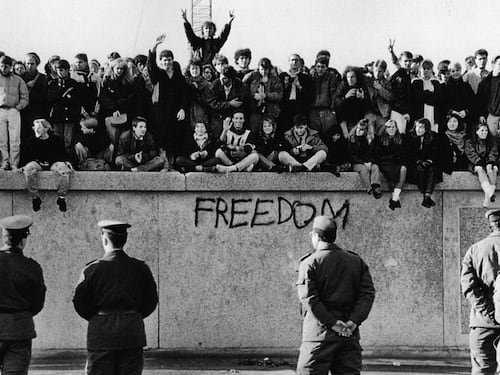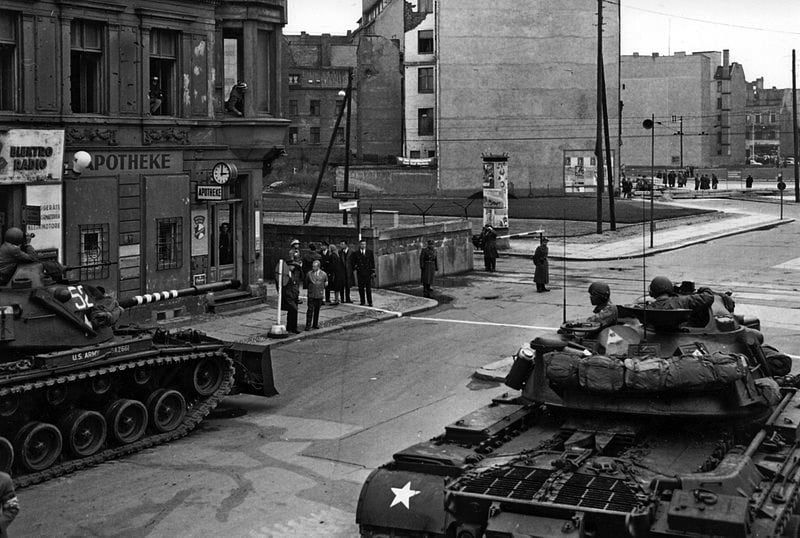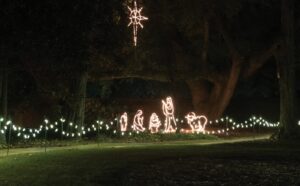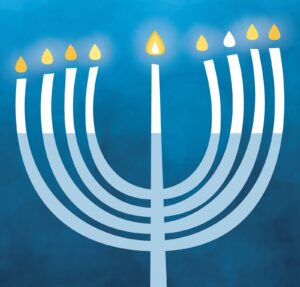My family has always had a strong connection to Germany, and later, to Berlin. As a result, I have long thought that the fall of the Berlin Wall on November 9, 1989, with the geopolitical changes that resulted, was the most pivotal world event of my life.
Although neither had any German ancestry, my parents met in the 1930s, in Heidelberg, where they were both pursuing doctoral degrees. They returned to the United States in 1937, when Hitler’s influence was clearly on the rise. They married and started a family, and my father began his career as a college professor, but when the United States entered World War II, he joined the Navy as Communications Officer. The story of when his aircraft carrier was torpedoed and sank in the Atlantic has been told in previous issues of Bella. After the second “war to end all wars,” in which over 72 million people died, my parents converted to Quakerism, a religious organization known for pacifism and avoidance of military service.
After World War II, both Germany and its capital of Berlin were divided into 4 occupation zones (sectors), one each for the United States, Great Britain, France, and the Soviet Union. Berlin lay entirely within the Soviet sector. The 3 Western sectors later formed the country of West Germany, and the Soviet sector became the German Democratic Republic (GDR), East Germany, part of the Soviet bloc. Aware of the growing influence of Stalin as well as the underlying political and ideological differences with the West, over 3 million East Germans, primarily the young and well-educated, emigrated to the West. By the early 1950s, a barbed wire fence separated East Germany from West, but Berlin, part East and part West, still provided a loophole through which East Germans could escape.
On Sunday, August 13, 1961, a concrete and barbed wire wall was constructed around West Berlin. 27 miles of it separated it from the city of East Berlin; the rest closed West Berlin’s border with East Germany. The wall was protected by a “no man’s land,” armed guards, over 100 guard towers, dogs, bunkers, and trenches. Many lost their lives trying to escape over, under, or through the wall. From one day to the next, families and friends were divided by the wall. Employees could no longer travel to jobs on the other side. Parents were separated from children and grandparents. It was not possible for those on either side to visit the other side.
Early in 1962, my father took a position with the American Friends Service Committee (Quakers) as civilian negotiator (not in any official government capacity) to Berlin. His mission was to talk with high-level government officials in both Germanys to try to reduce tension and bring about mutual understanding. During 1962 – 1964 we lived in Berlin, a large city completely surrounded by walls and a hostile country. We were there during the Bay of Pigs and the Cuban Missile Crisis, both times of extreme tension between the Communist bloc and the United States. As United States citizens, we could travel into East Berlin through Checkpoint Charlie and other checkpoints, and we often did. On Sundays we alternated between attending Quaker meetings in West Berlin and East Berlin. As a small child, the tanks, machine guns, barriers, and armed guards at the crossings were frightening to me.
My sister Ursula had a special affinity for Germany, and she won 2 Fulbright scholarships to study oboe with Lothar Koch, the 1st oboist in the Berlin Philharmonic. By 1989 she was herself chief oboist in the Theater des Westens, the primary theater in West Berlin. She also had a number of oboe students, played in several other groups and churches, substituted at the Berlin Opera, and owned a woodwind repair shop. And this brings us to November 9, 1989, and excerpts from her letters.
Thursday 9th evening, at Theater I heard the East was opening its borders! Not a joke? We’ve been amazed at so much in the past month, demonstrations etc., 2 days ago the government stepped down, to rule until replaced. Politbüro [communist party ruling committee] meeting around the clock, under pressure indeed. But this astounded us all, was the only talk …
Just after midnight I drove home, down Joachimstaler-Bundesallee. Some East cars visible already, and strangers East & West honking & waving at each other. Tears came to my eyes as I passed & waved at the first Trabi, again now as I write this Monday. Watched TV reports a while: evening was a first “live” TV interview/dialogue between East & West politicians, where a GDR man already admitted the open borders made the existence of the Wall a question mark in time. Some pictures from the Wall, people on both sides climbing up, helping each other to the top, a real party, with border guards quiet farther back. People pouring through the border crossings with almost no controls (so some West Berliners went East too). I was very tempted to go, either to Checkpoint Charlie or the Brandenburg Gate, but my schedule didn’t allow it.
I took the U-Bahn [subway] to an important Theater meeting to avoid traffic & parking problems. My city stop is Kudamm [main downtown shopping district] itself, which was mighty full then, fuller yet when we came out again at 2:30. Bilka [huge department store] had a large handwritten sign of money exchange in the store, 10 GDR to 1 DMark. Several cafés were selling plastic cups of coffee for half a Mark (on Kudamm usually several Marks!) East or West money. I was surprised at so many GDR cars parked around Steglitz [section of Berlin], then Walter told me they were parked all over sidewalks in Zehlendorf [another section] too, where police cars had loudspeakers welcoming GDR visitors to park anywhere, just not in driveways. I’d expect lots of cars in shopping areas, but so many of these must have been visiting relatives or friends.
Friday 10th – There was a moving end to national parliament yesterday, when evening news of the border opening caused them to adjourn, and all parties rose to sing the national hymn together, some again with tears in their eyes.
to be continued …

In November of 1989 the dreaded Berlin Wall became a place of celebration.
The Trabant, or Trabi as it was affectionately known, was an inexpensive East German auto, the only automobile available to most East Germans, although party VIPs could acquire the more expensive and reliable Wartburg.

We crossed into East Berlin at Checkpoint Charlie, guarded by tanks and armed military personnel.























